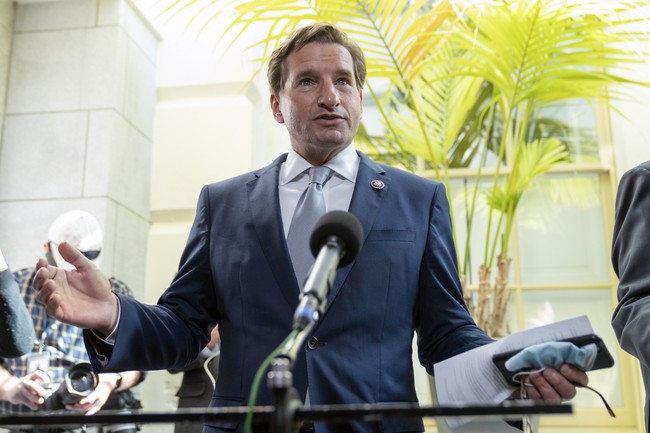
Rep. Dean Phillips hasn’t been shy about calling out the Democratic Party’s missteps, and after the debacle of the 2024 election, it’s hard to say he’s wrong.
Advertisement
The Democrats’ decision to back Joe Biden as their sole candidate, despite serious concerns about his age and capacity to go head-to-head with Trump, ended up being a critical mistake. By paving the way for Biden without considering other options, and then scrambling to hand the campaign over to Kamala Harris at the last minute, the Democratic Party set itself up for a loss that might have been avoidable.
Phillips has been vocal about what he sees as the party’s failure, and his criticisms warrant serious consideration.
The Warning Signs Democrats Ignored in 2024
Phillips, who represents Minnesota, was one of the few Democrats willing to challenge Biden in the 2024 primaries. He warned that Biden, at 81, might not have the stamina or public perception needed to take on Donald Trump in a tough, polarized election. His primary challenge was a bid to bring these concerns to the forefront, but it was met with resistance from the party. Many Democrats who shared Phillips’ worries were “suppressed and disenfranchised,” as he put it, as the party rallied around Biden without addressing the real risks.
READ MORE: Dean Phillips Posts Brutal Message About Biden’s Incoherence
The outcome? After a difficult debate against Trump, Biden pulled out of the race, leaving the party scrambling.
The campaign was handed to Vice President Kamala Harris in a last-minute switch that didn’t leave her with the momentum or resources needed to take on a well-funded and highly motivated Trump campaign. Phillips might not have gotten far in the primaries, but his warnings about the potential fallout now seem almost prophetic.
Advertisement
The Consequences of Ignoring Internal Criticism
Phillips’ experience reflects a broader issue within the Democratic Party. According to him, there was a “shield” around Biden, protecting him from scrutiny and making him appear more physically and mentally fit for the role than he was. The party, Phillips argues, ignored voices from within, focusing instead on propping up an incumbent without fully addressing his limitations.
This approach didn’t just backfire—it alienated many Democrats who felt their concerns were dismissed. Phillips believes that this lack of transparency and openness within the party is partly to blame for the rise of “Trumpism,” as people grow tired of being sidelined by political elites.
As he put it, the Democratic establishment created conditions that encouraged disillusionment and frustration, leading to more support for outsiders like Trump.
Kamala Harris and the Last-Minute Switch
The decision to hand the campaign over to Kamala Harris was another point of contention. While Harris has been a prominent figure within the party, she faced an uphill battle against Trump, who capitalized on her perceived weaknesses. Phillips points out that Biden wasn’t the only Democrat who could have struggled to beat Trump, but the lack of alternative options and the late timing left Harris with little chance to mount a strong campaign.
Advertisement
Phillips’ criticism here is worth considering. If the Democratic Party had opened the field sooner, they might have found a candidate with broader appeal or more momentum to take on Trump.
Instead, by sticking with Biden until the last possible moment, they limited their own options and ultimately handed the GOP a significant advantage.
Why Transparency and Inclusivity Matter for Democrats’ Future
At the core of Phillips’ argument is a call for greater transparency and inclusivity within the Democratic Party. Phillips has expressed frustration with a political system that he says “disenfranchises” voices within the party who raise difficult questions. For Phillips, this isn’t about tearing down the Democratic Party but about reforming it so that it’s more responsive to the concerns of its members—and, by extension, the concerns of American voters.
If the Democratic Party wants to avoid another situation like 2024, it needs to take Phillips’ message to heart. That means embracing open dialogue, welcoming dissenting opinions, and ensuring that candidates are chosen not just based on incumbency, but on who can truly inspire and energize voters. The “shield” Phillips describes, where establishment figures are protected from criticism, only serves to alienate the very people the party needs to engage.
What Dean Phillips’ Criticism Means for the Democratic Party’s Future
Advertisement
Phillips isn’t advocating for a split from the Democratic Party, but his critiques serve as a wake-up call. By failing to listen to internal warnings, the party not only weakened its own chances in 2024 but risked pushing away voters who are tired of feeling like their voices don’t matter. If the Democratic Party doesn’t start addressing these issues, they’ll continue to struggle in future elections—and may see an even greater rise in support for outsiders who claim to “shake up the system.”
The Path Forward: Listening, Adapting, and Rebuilding Trust
Before I continue, and before some of you get mad at me for giving advice to the Democrats to try and make them better:
1. I believe in the almost capitalist style of politics: The Republican Party can only get better when they have competition. When the Democrats are at their lowest, you and I both know there’s nothing stopping them from going to the left because it’s easier.
2. You and I also know that the Democrats are not going to take advice from a conservative radio show host and columnist at RedState Dot Com, so it likely doesn’t matter.
Moving forward, the Democratic Party needs to engage in some serious self-reflection. Phillips’ message isn’t just a one-off complaint; it’s a roadmap for rebuilding trust with voters. Embracing transparency and allowing open competition in the primaries could reinvigorate the party, making it clear that Democrats stand for more than just “not Trump.” They need to show they are a party that listens, adapts, and genuinely represents the will of the people.
Advertisement
In the end, Phillips may not have succeeded in his primary challenge, but his voice has become one of the loudest within the party for a reason. He’s articulating what many Democrats feel but are afraid to say: that without significant changes, the party risks losing its way—and losing its ability to connect with the people it claims to represent.
If Democrats want to build a stronger future, they’ll need to take Phillips’ criticisms to heart and make real, meaningful changes to how they operate.

